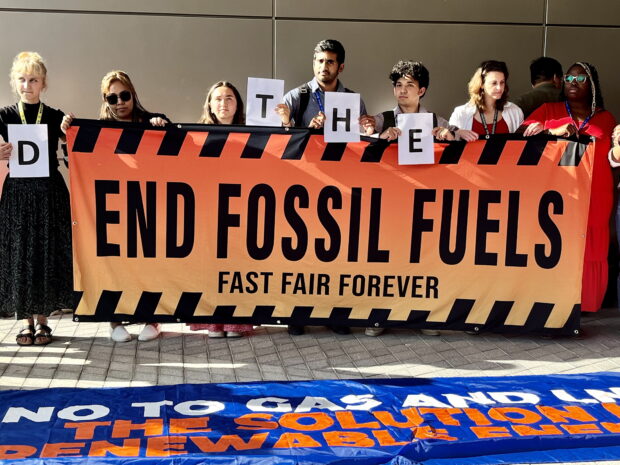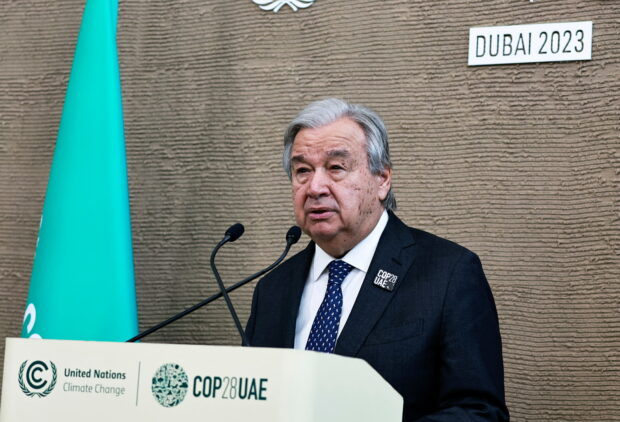UN chief to world leaders: End fossil fuel age

URGENT CALL Climate activists gather outside the main venue of the COP28 talks in Dubai on Sunday to reiterate their call for countries to junk fossil fuels. —IMELDA V. ABAÑO
DUBAI—In about 24 hours, governments around the world are expected to arrive at a consensus on climate change commitments. Failure to agree on climate finance and phasing out fossil fuels are two crucial issues that are still subject for debate ahead of the Tuesday deadline.
More than 80,000 delegates meet for the two-week conference in the oil-rich country of United Arab Emirates to assess the progress of countries in meeting emissions reduction eight years after the signing of the Paris Agreement on climate change. The Paris deal aims to limit global warming to 1.5 degrees Celsius to avoid catastrophic climate change and to scale up finance for developing countries.
United Nations Secretary General Antonio Guterres expressed concern over the slow progress on the negotiations and urged countries to resolve remaining sticking points. (See related story in World, Page B4.)
“The world is on the brink of climate disaster and this conference must mark a turning point. I renew my urgent appeal to leaders to recommit the 1.5 degrees Celsius (1.5 C) warming limit, end the fossil fuel age and to deliver climate justice,” Guterres said.
Epic battle
For Tony La Viña, a former Philippine climate negotiator and now associate director for climate policy and international relations at the Manila Observatory, what the public is seeing in the last few days of the United Nations 28th Conference of Parties (COP28) is an epic battle between thousands of fossil fuel lobbyists and tens of thousands of climate justice activists aligned with scientists, indigenous peoples, religious leaders and local governments, among other stakeholders.
This, he said, is reflected as a battle between a few big governments like the United States aligned with oil-producing countries.
“The outcome is on the balance, on whether 1.5 C global warming limit will be breached because Dubai fossil fuel interests prevailed over good science, common sense and solidarity among nations,” La Viña explained further.
The draft text of the Global Stocktake document, which would be the principal output of COP28, has underlined the need to do away with all fossil fuels like oil, gas and coal.
“The phaseout by a date certain of all fossil fuels is the outcome we want,” La Viña said. “But that must be accompanied by a just transition for developing countries, including the Philippines, that will support the energy transition in our countries, enable climate adaptation and address loss and damage that would benefit poor countries impacted by extreme storms, rising seas, severe floods and drought.”
At the climate summit, more than 130 countries, including the Philippines, have pledged to triple global renewable power capacity by 2030 and double the annual rate of energy efficiency improvements every year to 2030.
But the International Energy Agency, in its report released at COP28, said the pledges would not be enough to reach the 1.5 C goal as these represent only around 30 percent of the emissions gap.
Advice to PH delegation
Environment Undersecretary Analiza Teh, who is a part of the Philippine delegation, said the country “takes a strong stance in pushing for immediate operationalization of loss and damage fund, mobilizing climate finance based on the needs of developing countries, just energy transition to ensure that people’s welfare remains at the center of the transition to low-carbon development.”
For Gerry Arances, executive director of the Center for Energy, Ecology and Development, the Philippines’ position must still be aligned to the 1.5 C goal.
“We welcome the stand of our government but we will be vigilant because we all know that under the Philippine energy plan, there’s still a lot of coal and fossil gas. And there is no talk of fossil fuel phaseout,” Arances said.
He said the Philippine delegation must “rise to the occasion” and demand a complete phaseout of fossil fuels—the main drivers of climate change.
Arances noted that the “indecisiveness” of the Philippine delegation on the matter of fossil fuels was reflective of a policy incoherence in government.
“We’re touted as one of the best countries in terms of [enacting a] climate change act, renewable energy law, but our power plants are still fossil fuel-dominated,” he said. —WITH A REPORT FROM JANE BAUTISTA INQ
